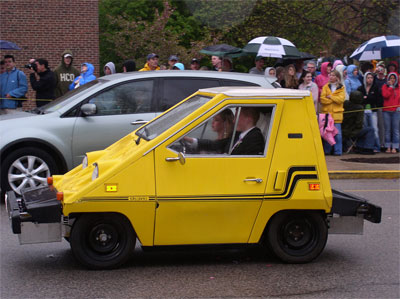Electric (car) Dreams
Written by Justin Graeber for The Duxbury Clipper
Tuesday, 22 September 2009 15:43

He calls it “The Cheese Wedge.” Chad Conway’s bright yellow automobile is one of the most unusual cars you’ll see on the road, even in an age when smart cars and hybrids are becoming more common. The small, angular car is an electric model built in the 1980s called a Comuta-Car. It was one of 3,000 built by a Florida-based company called Commuter Vehicles Incorporated, Conway said.
Always a car guy, in high school Conway was looking for a project, initially experimenting with kits where one builds a car from scratch.
Eventually, his teacher Chris Connors pointed him in the right direction.
“He knew I was looking for a project, and it turns out he had this 1980 commuter car he had in his garage he was looking to fix up and get running again,” Conway said.
In the fall of his sophomore year, Conway moved the car from a garage to a space at the high school. Although the body of the car was basically intact, the electrical system needed a lot of work.
“A previous owner had attempted to upgrade the car to a 70 volt system ... basically the wiring was in shambles,” Conway said.
Over the next year and a half Conway, with help from his teacher, his friends and his father and an Internet group (where he found the electrical schematics,) worked on the car, getting it ready to drive in the July 4th parade, and then the prom.
“It was definitely a big learning curve,” he said.
The irony of the Comuta-Car is that it was another gas crisis that gave rise to the company, just like the most recent spike in oil prices fostered the current interest in hybrid and electric vehicles.
“They advertised them as, ‘you don’t have to stop at the gas station and wait in line for gas.’ They really spun off the oil crisis.”
The cars eventually went out of production due to increased highway and safety standards.
“They were kind of ahead of the game in a big way,” Conway said.
The car can get up to about 40 miles per hour, and can be driven all about Duxbury, on Route 3A and Route 53, but Conway wouldn’t drive on major highways such as Route 3.
“It’s completely road compatible. It’s grandfathered in as street legal vehicle,” Conway said.
The car doesn’t drive like a normal vehicle, however. The car’s accelerator, called an “energy pedal,” has three settings that the driver clicks through. The first “click” takes the car from 5-10 miles per hour, the second “click” is 15-25, and the third will take the car up to its full speed of about 40 miles per hour.
“It’s not like a regular throttle that you push down and it quickly accelerates,” Conway said.
Conway is currently a sophomore double majoring in electrical and mechanical engineering at the Rose-Hulman Institute of Technology in Indiana. Although he always had an interest in being an engineer, he said the Comuta-car project solidified his interest in the field, and now he wants to work with electric cars as a career.
Right now he is the electrical team leader on a two-year EcoCAR Project, where students are given the body of a Saturn Vue and are asked to create a new efficient power train.
“It’s really great, it’s hands on. We’re using the same software GM uses,” he said.
Currently, the “Cheese Wedge” is in Duxbury, but Conway’s family might be using a custom built trailer to bring the car to Indiana. The car still gets a lot of attention around Duxbury.
“I think there’s potential in that market for [electric] cars, a second car, you can have it at your house,” Conway said. “Driving that car, everyone I see, people are just like, ‘where can I buy one.’”
Comments (0)
You don't have permission to comment on this page.